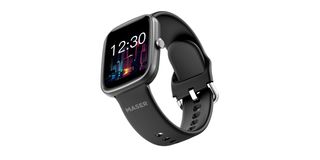Why Maser is creating waves in Africa's wearables market

A Maser smart watch.
What you need to know:
- A Maser smartwatch allows you to connect to your phone, monitor your sleep patterns, heart rate, initiate and answer phone calls.
- Maser’s devices are 5G-enabled, and users in these countries will only plug and play compared to existing market brands that still rely on 4G chips.
Just what are wearables? A device that can be worn, right? But in the contemporary world, wearables mean smartwatches, virtual reality headsets, AI hearing aids, smart glasses, fitness trackers and smart jewelry.
These devices are all over the United States, Europe and Asia but are now breaking ground and entering the African market by storm and the company leading the race is Dubai-based tech firm Maser.
After realizing how youths in the continent are rising to the occasion to get acquainted with the latest tech skills and going ahead to spend on latest devices such as smartphones, smart speakers and smart TVs, Maser has been in the frontline mission of supplying the market with what youths now want most – smart wearables.
Over the years, quality and affordability have been Maser’s unique selling points in an electronics market flooded by brands such as Samsung, Apple, Oppo, Huawei and Tecno and is betting on the same to grab a firm grip on the wearables market.
“Technology should not be expensive. Manufacturers must maintain the quality but sell devices at affordable rates because there is a huge population locked out of technology due to high prices. At Maser, we want every African to afford wearables,” Maser chief executive Prateek Suri told Nation.Africa.
He adds that Africa’s digital economy will be powered by the youth, and selling them devices at good prices is one way of empowering them because “they can use the excess money they were to spend to create more opportunities for fellow youth.”
Read: Technology comes to the rescue for people living with disabilities
Last year, Maser set up a warehouse in Nairobi from where it has been supplying electronics to Uganda, Tanzania and Malawi and invested Sh10 billion in west Africa last February.
Maser’s smartwatches are retailing at Sh7,000 in Nairobi, compared to Huawei’s Sh13,000 for the same quality of device while Samsung asks for Sh26,000 for a smartwatch of similar capability and features.
Maser has been giving competitors a run for their money by doing every single aspect of manufacturing, sales and customer service better. It is betting on these pillars to gain popularity in the African market.
In recent years, Africa has shown great results in terms of sales in the wearable market, but those who are able to purchase have a challenge of maintenance, as the limited availability of official service outlets forces them to take the devices for repair by untrained people.
“We will have licensed repair centres in major towns. We want to make it easy for users of our wearables to maintain them. Repair fees will also be subsidized,” says Mr Suri.
A Maser smartwatch allows you to connect to your phone, monitor your sleep patterns, heart rate, initiate and answer phone calls, read emails and messages, receive weather report updates, listen to music, dictate emails or text messages, use it as a mobile wallet or a personal digital assistant.
Read: Samsung devices shaping the future of smart experience
Maser will also benefit from the high internet connectivity in East Africa and the reducing cost of mobile data to onboard more users of its devices. Kenya, Uganda and Ethiopia are already testing 5G while Tanzania has commissioned the exploration of the technology.
Maser’s devices are 5G-enabled, and users in these countries will only plug and play compared to existing market brands that still rely on 4G chips.
The easing of supply disruptions saw the Middle East and Africa (MEA) region’s wearables market rebound in quarter three (Q3) 2020.
The market recorded year-on-year unit growth of 15.8% in Q3 2020, while its value was up 33.9% over the same period. This is according to the latest insights from the International Data Corporation’s (IDC’s) Worldwide Quarterly Wearable Device Tracker, which shows three million units worth $405.6 million were shipped to the region during the third quarter of the year.
“Covid-19 restrictions fuelled demand during Q3 2020, with remote working and home-schooling policies pushing consumers to look for more compatible devices to ensure productivity,” says Nourhan Abdullah, senior research analyst at IDC.
With the number of connected wearable devices in the MEA region expected to reach 46 million by end of 2022 according to Cisco, the region's wearables market is in the midst of the significant transformation and Maser stands a chance to be the biggest supplier.





